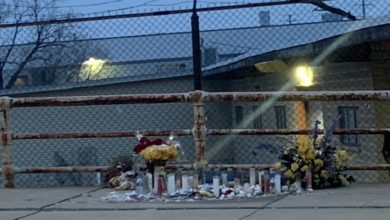On the afternoon of July 14, Chicago Police Department officers gunned down Harith “Snoop” Augustus in the South Shore neighborhood of Chicago as he was walking home from his job at a barbershop. CPD officials said that Augustus was stopped by police officers because he was “exhibiting characteristics of an armed person.”
On the night of July 14 the CPD went on a violent rampage against community members who came out to protest Harith’s lynching. After the killing, the community had quickly mobilized to protest the CPD for hours. The police attacked the crowd of protesters, which included women and children. Even a journalist with the Chicago Sun-Times, a major city paper, was pushed to the ground by officers. Multiple protesters were arrested or hospitalized because of the assault.
The cops released a short edited video on July 15 with no audio that highlighted what looks like a gun on Augustus’s waist band. However, this is irrelevant as Augustus had a permit to carry the weapon and Illinois is an open carry state. Citing the weapon as an excuse for shooting Augustus in the back and killing him in the street in the middle of the day is as racist as any other excuse the cops use for killing Black people with impunity. Activists and lawyers have denounced the release of the brief, edited video and are demanding that all video and audio of the murder be released immediately.
The South Shore is a working-class, Black neighborhood in Chicago. Along with decades of historical disinvestment and racist policing, in recent years residents have become concerned about gentrification and the new deployment of mostly white police who are especially disrespectful and aggressive. The murder of Augustus by police in broad daylight was the latest injustice against the community, and has been the catalyst for days of protest against police brutality and murder.
On Sunday, July 15, hundreds of members of the community and supporters from around the city came out again in the afternoon to protest the police murder. Mothers who had lost their children to CPD led the march through the neighborhood. The aim of the march, as announced by activist William Calloway, was to peacefully march onto Lake Shore Drive. Police were out in force, with their SUVs racing to block off any routes that led to that major roadway. Chants of “Justice or Else” and “CPD, KKK, How Many Kids Did You Kill Today” reflected the militant tone of the protest and anger of the community. The march did not reach Lake Shore Drive, but protesters were disciplined and avoided conflict with the provocative police presence.
Nasiir Yasiim was at the rally on Sunday, and said, “In order for police to be held accountable, we need to rise up. Black, white, Hispanic, we need to come together as one.” He said that in South Shore, he “always saw white cops,” and that in order for real safety to exist, “we need to govern ourselves.” Frustrated by the oppression and violence the Black community still faces, he concluded, “We’ve been protesting since the Sixties, and nothing has changed.”
July 16, was the third straight day of protest. That evening hundreds once again came out onto the streets of the South Shore neighborhood in a protest called by Black Lives Matter Chicago and Chicago Alliance Against Racist and Political Repression. The multi-national character of the opposition to racist police violence was most obvious during this protest, as residents and organizations from across the city marched to demand justice for Harith Augustus. A march began across the street from where Augustus was shot, before going to local alderman Leslie Hairston’s office and then to the shop where Augustus had worked as a barber. Speakers at this protest tied the murder of Augustus to struggles for real oversight of the police and the fight to stop a new $97 million cop academy from being built on the primarily Black West Side of the city.
Robinson, a woman who has lived in South Shore for over 30 years and was attending the protest in her work uniform, said she “had no relationship with cops” that patrolled her community. She said “the new cops on patrol are negative with us, they don’t get to know who we are. We’re good people with common sense.”
Remy, an artist who raps against gun violence, said that the police “Come and talk to us like we’re Palestinians,” comparing the CPD to an an occupying colonial force. He complained that, “The police have parking cameras everywhere to give us tickets, but don’t have recordings” for events of police harassment and brutality.
Both of them said there was a lighter police presence on that night because of the presence of multinational protesters from different parts of the city.. “We need people to come here and fight not only when there is a shooting,” said Robinson. They and speakers over the two days said the CPD attacked on the first night once television cameras had left, and the police felt safe to abuse the Black residents.
Residents of South Shore and from across Chicago are sure to be fighting for justice for Harith Augustus over the coming days and months. For comparison, Jason Van Dyke, the murderer of Laquan McDonald, just had his trial date set this month. That clear case of modern lynching took place in 2014, and is only publicly known and going to trial at all because of years of hard work by activists, many mass protests, and constant public pressure in the courtroom. Van Dyke’s conviction is still in doubt as well. Oppressed communities in Chicago deserve justice now, and any means they choose to fight for justice should be supported.
Justice for Snoop!






